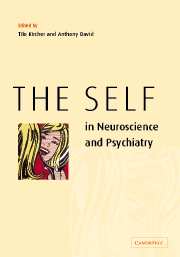Book contents
- Frontmatter
- Contents
- List of contributors
- Introduction: the self and neuroscience
- Part I Conceptual background
- Part II Cognitive and neurosciences
- 5 The multiplicity of consciousness and the emergence of the self
- 6 Asynchrony, implicational meaning and the experience of self in schizophrenia
- 7 Self-awareness, social intelligence and schizophrenia
- 8 The neural correlates of self-awareness and self-recognition
- 9 Autonoetic consciousness
- 10 The neural nature of the core SELF: implications for understanding schizophrenia
- Part III Disturbances of the self: the case of schizophrenia
- 11 Self and schizophrenia: a phenomenological perspective
- 12 Self-disturbance in schizophrenia: hyperreflexivity and diminished self-affection
- 13 The self-experience of schizophrenics
- 14 The paranoid self
- 15 Schizophrenia and the narrative self
- 16 Self-narrative in schizophrenia
- 17 Schizophrenia as disturbance of the self-construct
- 18 Action recognition in normal and schizophrenic subjects
- 19 Disorders of self-monitoring and the symptoms of schizophrenia
- 20 Hearing voices or hearing the self in disguise? Revealing the neural correlates of auditory hallucinations in schizophrenia
- 21 The cognitive neuroscience of agency in schizophrenia
- 22 Self-consciousness: an integrative approach from philosophy, psychopathology and the neurosciences
- References
16 - Self-narrative in schizophrenia
from Part III - Disturbances of the self: the case of schizophrenia
Published online by Cambridge University Press: 18 December 2009
- Frontmatter
- Contents
- List of contributors
- Introduction: the self and neuroscience
- Part I Conceptual background
- Part II Cognitive and neurosciences
- 5 The multiplicity of consciousness and the emergence of the self
- 6 Asynchrony, implicational meaning and the experience of self in schizophrenia
- 7 Self-awareness, social intelligence and schizophrenia
- 8 The neural correlates of self-awareness and self-recognition
- 9 Autonoetic consciousness
- 10 The neural nature of the core SELF: implications for understanding schizophrenia
- Part III Disturbances of the self: the case of schizophrenia
- 11 Self and schizophrenia: a phenomenological perspective
- 12 Self-disturbance in schizophrenia: hyperreflexivity and diminished self-affection
- 13 The self-experience of schizophrenics
- 14 The paranoid self
- 15 Schizophrenia and the narrative self
- 16 Self-narrative in schizophrenia
- 17 Schizophrenia as disturbance of the self-construct
- 18 Action recognition in normal and schizophrenic subjects
- 19 Disorders of self-monitoring and the symptoms of schizophrenia
- 20 Hearing voices or hearing the self in disguise? Revealing the neural correlates of auditory hallucinations in schizophrenia
- 21 The cognitive neuroscience of agency in schizophrenia
- 22 Self-consciousness: an integrative approach from philosophy, psychopathology and the neurosciences
- References
Summary
Abstract
Proper structures of self-narrative depend on at least four capacities in the narrator: (1) a capacity for temporal integration of information; (2) a capacity for minimal self-reference; (3) a capacity for encoding and retrieving autobiographical memories; (4) a capacity for engaging in reflective metacognition. This chapter explicates the cognitive, phenomenological, narratological and neurological details of these four capacities and their dysfunction in schizophrenia, as evidenced by schizophrenic self-narrative.
Introduction
The concept of the narrative self involves a diachronic and complex structure that depends on reflective experience and on factors that are conceptual, emotional and socially embedded. According to a narrative approach, persons constitute their own identity by formulating autobiographical narratives – life stories (Schechtman, 1996). In this chapter I want to explore issues pertaining to the generation and structure of the narrative self in schizophrenia. Normal generation of a narrative self depends on the proper functioning of a variety of cognitive capacities, including capacities for short-term temporal processing (working memory), self-awareness, episodic memory and reflective metacognition. Neuropsychological research suggests that in schizophrenia the mechanisms responsible for each of these elements are frequently disrupted. It should not be surprising that, as a result, schizophrenic narratives, and the self that is constituted through them, are problematic, both in structure and content. (Problems with narrative self-identity begin at the prodromal stage for preschizophrenic subjects at school age (Hartmann et al., 1984).
- Type
- Chapter
- Information
- The Self in Neuroscience and Psychiatry , pp. 336 - 358Publisher: Cambridge University PressPrint publication year: 2003
References
- 28
- Cited by

